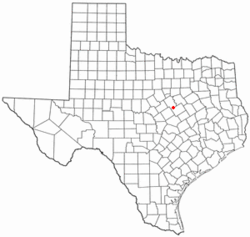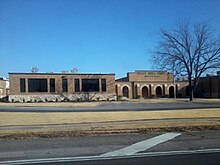
McLennan County is a county located on the Edwards Plateau in Central Texas. As of the 2020 census, its population was 260,579. Its county seat and largest city is Waco. The U.S. census 2023 county population estimate is 268,583. The county is named for Neil McLennan, an early Scottish settler who worked to evict the Native Americans in frontier Texas. McLennan County is included in the Waco Metropolitan Statistical Area.

Johnson County is a county located in the U.S. state of Texas. As of the 2020 census, its population was 179,927. Its county seat is Cleburne. Johnson County is named for Colonel Middleton Tate Johnson Sr., a Texas Ranger, politician and soldier in the Mexican-American War and the American Civil War. Johnson County is included in the Dallas–Fort Worth–Arlington metropolitan statistical area.

Hill County is a county in the U.S. state of Texas. As of the 2020 census, its population was 35,874. Its county seat is Hillsboro. The county is named for George Washington Hill, secretary of war and secretary of the navy under the Republic of Texas. Hill County is part of Central Texas, though not included in the Texas Hill Country.

Hamilton County is a county located on the Edwards Plateau in the U.S. state of Texas. As of the 2020 census, its population was 8,222. The county seat is Hamilton. The county was created in 1858. It is named for James Hamilton Jr., a former governor of South Carolina who gave financial aid to the Republic of Texas.

Coryell County is a county located on the Edwards Plateau in the U.S. state of Texas. As of the 2020 census, its population was 83,093. The county seat is Gatesville. The county is named for James Coryell, a frontiersman and Texas Ranger who was killed by Caddo Indians.

Bosque County is a county located in the greater Waco area. The county sits just northwest of Waco in the U.S. state of Texas. As of the 2020 census, the population was 18,235. Its county seat is Meridian, while Clifton is the largest city and the cultural/financial center of the county. The county is named for the Bosque River, which runs through the center of the county north to south. The Brazos River makes up the eastern border, along with the Lake Whitney reservoir it feeds.

Clifton is the largest city in Bosque County, Texas, United States. The city's population was 3,465 at the 2020 census. Clifton and the surrounding area was settled by Norwegian settlers in the mid 1800s. Today, this areas is in the National Register of historic places as the Norse Historic District.
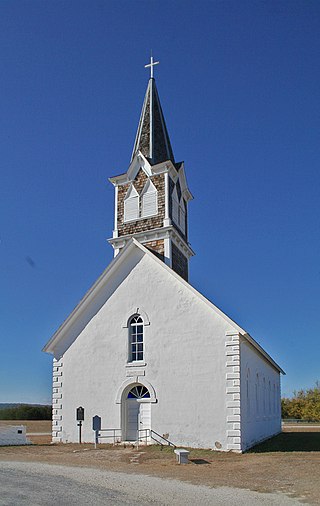
Cranfills Gap is a city located in Bosque County in central Texas, United States. It was founded by Norwegian Emigrants and to this day most residents can trace their lineage to those Norwegian Founders. The Bosque county area surrounding Cranfills Gap is listed on the National Register of Historic places as the Norse Historic District. The population was 277 at the 2020 census.

Meridian is a city in and the county seat of Bosque County in Texas, United States. It is forty-seven miles northwest of Waco. The population was 1,396 at the 2020 census.

Jayton is a city in and the county seat of Kent County, Texas, United States. It is located in the northeastern portion of the county, and the population was 511 as of the 2020 census.

Hewitt is a city in McLennan County, Texas, United States. The population was 16,026 at the 2020 census, making it the second largest city in the county. It is part of the Waco Metropolitan Statistical Area.
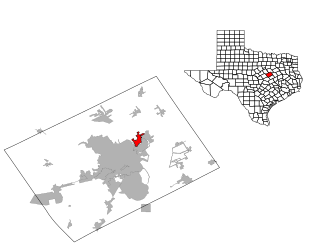
Lacy Lakeview is a city in McLennan County, Texas, United States. It is part of the Waco Metropolitan Statistical Area. The population was 6,988 at the 2020 census. The city's name is sometimes spelled with a hyphen, but the official spelling omits the hyphen.
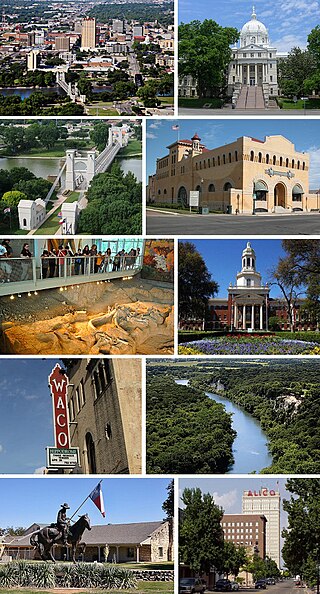
Waco is a city in and the county seat of McLennan County, Texas, United States. It is situated along the Brazos River and I-35, halfway between Dallas and Austin. The city had a U.S. census estimated 2023 population of 144,816, making it the 24th-most populous city in the state. The Waco metropolitan statistical area consists of McLennan, Falls and Bosque counties, which had a 2020 population of 295,782. Bosque County was added to the Waco MSA in 2023. The 2023 U.S. census population estimate for the Waco metropolitan area was 304,865 residents.

Goldthwaite is a town and the county seat of Mills County, Texas, United States. The population was 1,738 at the 2020 census, down from 1,878 at the 2010 census.

Clarksville is a city and county seat of Red River County, Texas, United States, in the northernmost part of the Piney Woods region of East Texas. As of the 2020 census, the city population was 2,857.

Glen Rose is a city in and the county seat of Somervell County, Texas, United States. As of the 2020 census, the city population was 2,659.
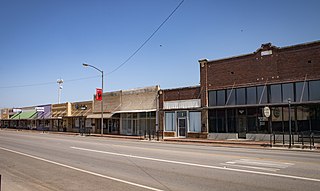
Olney is a city in Young County, Texas, United States. Its population was 3,007 as of the 2020 census.
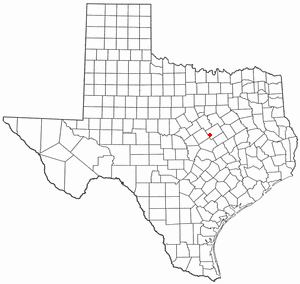
McGregor is a city in McLennan and Coryell counties in the U.S. state of Texas. The population is estimated to be 5,823 by the Texas Demographic Center.

Bruceville-Eddy is a city in McLennan and Falls counties in the U.S. state of Texas. Its population was 1,413 at the 2020 census.
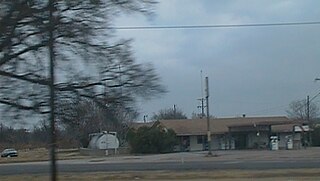
Golinda is a city in Falls and McLennan counties in the U.S. state of Texas. The population was 618 at the 2020 census, an increase over the figure of 559 tabulated in 2010.

